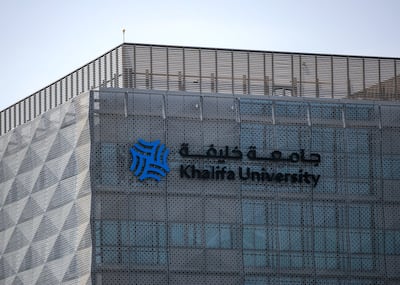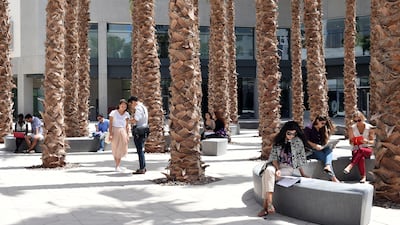Universities in the Emirates are being subjected to regular assessments and clustered into groups based on performance, authorities announced on Thursday.
The new grading system for universities was introduced to raise standards and allow institutes in the UAE to compete internationally, a senior figure from the Ministry of Education told The National.
Both public and private higher education institutions are included in the assessment, with rankings based on factors including teaching quality and student life, employability, scientific research and international collaboration.
Under the new framework, institutions are divided into two categories: research and non-research institutions. They will then be clustered into groups depending on performance – with group one representing the best performing with group four being the lowest.
“The ultimate aim is to have our universities competing internationally, [not just] one or two institutions but for the whole sector to raise their standards,” Dr Mohammad Al Mualla, undersecretary for Higher Education Academic Affairs at the Ministry of Education, told The National.
“By announcing the results and sharing the details with the universities, they can pinpoint areas where they need to improve.
“We will support them in any way that we can in terms of raising the standards and improving their performance.”
Clustered approach
The methodology was developed by the Ministry of Education over six years after discussions with higher education institutions and global education experts such as Times Higher Education and Quacquarelli Symonds (QS).
The first cluster rating for research universities in the UAE was revealed on Thursday.
The top five performing universities that made it into group one were the American University of Sharjah, the United Arab Emirates University, Khalifa University, Mohammed bin Rashid University of Medicine and Health Sciences, and New York University Abu Dhabi.
Group one comprises universities that excelled or exceeded expectations in most of the indicators, while universities in group two are those that achieved excellent results, according to the ministry.
Universities are excluded if they do not teach bachelor's degrees, have not been operating for at least five years, or have had their licences revoked.
“The idea here is that we use these indicators to measure the quality of the institution, and based on that, we classify the institutions into groups from one to four,” said Dr Al Mualla.
“This gives transparency to the students and parents on how these institutions perform in each of these areas and, based on that, they can make informed decisions in terms of selecting a university.”
In the initial phase higher education institutions were scored across four primary areas: research and innovation (35 per cent), teaching quality and student life (35 per cent), employment and labour market alignment (20 per cent), and international collaboration (10 per cent).
The ministry will announce the assessment criteria for the non-research universities in phase two of the programme at a later date.

Making the grade
Placing in the top cluster will increase a university's appeal, said Fabio Piano, vice chancellor of New York University (NYU) Abu Dhabi.
“This recognition in the outstanding category boosts NYU Abu Dhabi's local and global reputation, enhances its attractiveness to top students, faculty and staff, and draws more international collaborations, thus enhancing its global impact and competitiveness,” said Mr Piano, who was delighted with NYU Abu Dhabi's ranking.
“We couldn’t be more proud of today’s announcement and we look forward to building upon this momentum.
“This affirms the university's global reputation as a prestigious institution known for academic excellence, which helps attract top UAE and international students, faculty and staff who seek quality education and a global experience.”
He said the university’s academic reputation, research output, international outlook, state-of-the-art facilities and high employability of graduates are some of the factors that made it stand out.


